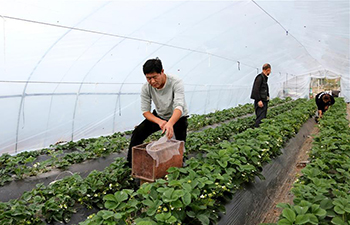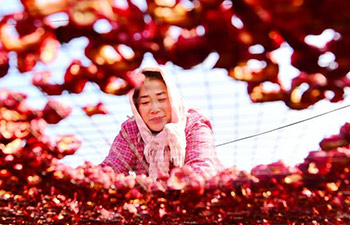NAIROBI, Nov. 14 (Xinhua) -- The Food and Agriculture Organization (FAO) of the United Nations said Wednesday it has devised a plan to support Kenya's fight against antimicrobial resistance.
Charles Babey, FAO's regional manager for eastern Africa in charge of emergency center for transboundary animal disease, said the antimicrobial national action plan will help Kenya minimize the misuse of antibiotic drugs.
"We are implementing the program in partnership with the ministry of agriculture, fisheries and irrigation in close collaboration with relevant stakeholders," Babey told delegates at a symposium in Nairobi.
He revealed that as a lead organization to promote good agricultural practices, FAO is in the process of conducting a Kenya action plan (KAP) study to understand agricultural practices that underpin the misuse and excessive use of antimicrobials in the poultry industry.
Babey noted that the findings of the study will inform and guide Kenya to promote the best agricultural practices that minimize the misuse and excessive use of antibiotics with ultimate contribution to effectively mitigate antimicrobial resistance in the country.
The UN official called on stakeholders to fight antimicrobial resistance through promoting prudent use of antimicrobials and fostering collaboration among various sectors.
"Only by working together, the international community will be able to address the challenges that antimicrobial resistance poses to sustainable development," he added.
Babey said that FAO recognizes the critical role played by antimicrobial drugs to achieve its goal of food and nutrition security but warned that they are often misused resulting in the potential risk of emergence and spread of antimicrobial resistant micro-organisms.
He said that the impacts and consequences of antimicrobial resistance are severe, which has become a major threat affecting health and food security, endangering the safety of food and environment.
"It is projected that by 2050 antimicrobial resistance could cause 10 million human fatalities annually and economic loss of 100 trillion U.S. dollars annually," he added.
Babey disclosed that FAO is also coordinating a project that engages the food and agriculture sectors in sub-Saharan Africa and South and Southeast Asia in the global efforts to combat antimicrobial resistance.
"The project that is known as Fleming fund phase 2 is being implemented in seven African and five Asian countries including Kenya," he said.
In order to mitigate the threat from antimicrobials, the World Health Organization (WHO), FAO and World Organization for Animal Health (OIE) have joined forces to develop the Global Action Plan on Antimicrobial Resistance.
Babey said that FAO has elaborated a five-year antimicrobial resistance action plan for 2016-2020 outlining actions to fight antimicrobial resistance in the food and agriculture sector.
"We believe that the action plan will guide countries to ensure the inclusion of the food and agriculture sector in the National Action Plans (NAPs)," he added.
He commended Kenya for developing antimicrobials NAP and antimicrobials policy in 2016, adding that the UN food agency will continue playing an active role in the fight against antimicrobial resistance.













